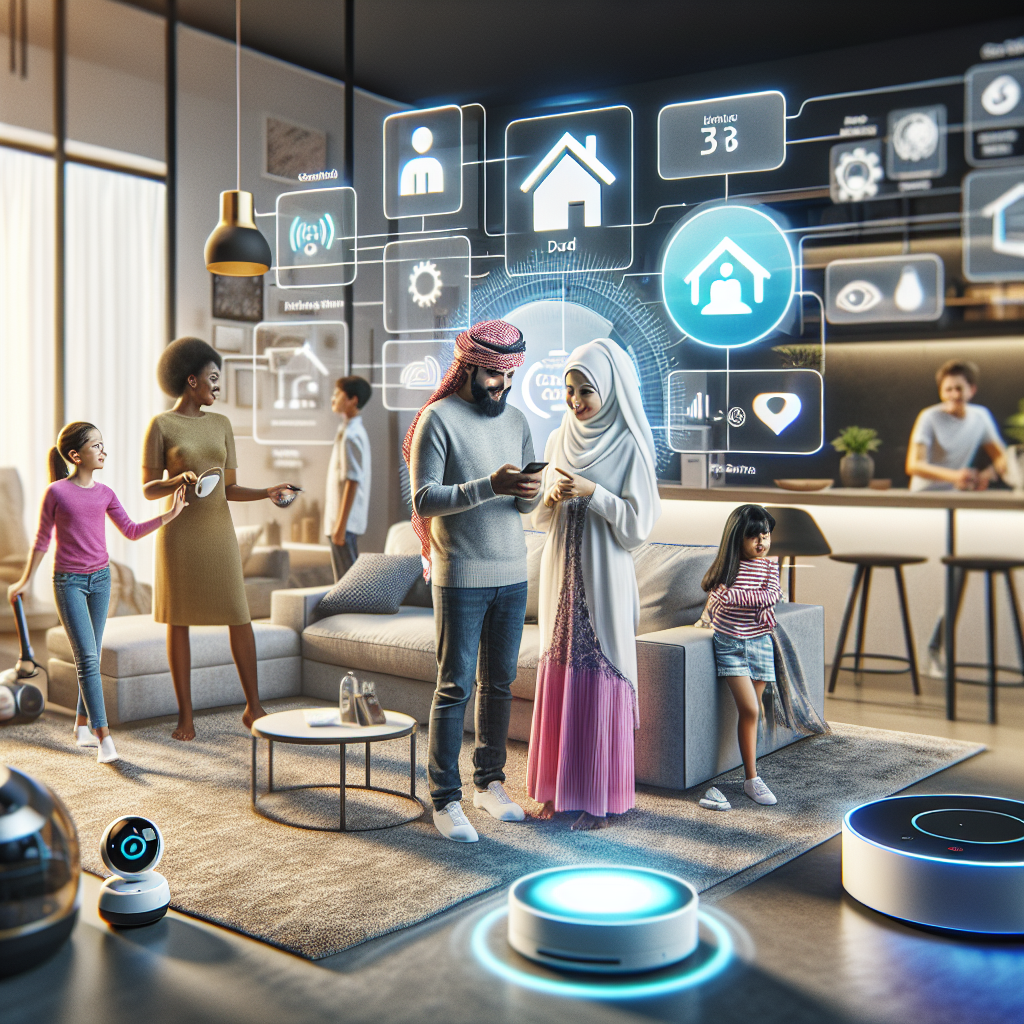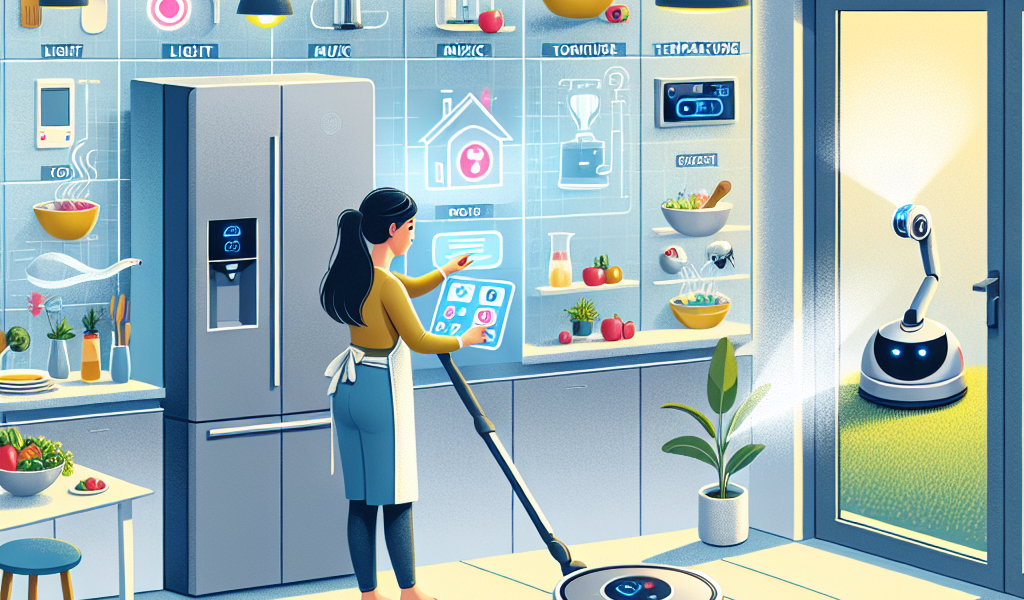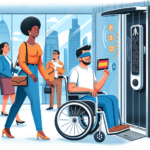-
Table of Contents
“Unlock Convenience and Efficiency with Smart Home Automation”
Introduction

Exploring the Benefits of Smart Home Automation
In an era where technology seamlessly integrates into our daily lives, smart home automation stands at the forefront of innovation, transforming the way we interact with our living spaces. This cutting-edge technology offers a myriad of benefits, from enhanced convenience and energy efficiency to improved security and personalized comfort. By leveraging interconnected devices and intelligent systems, smart home automation not only simplifies routine tasks but also creates a more responsive and adaptive environment. As we delve into the advantages of this technological advancement, it becomes evident that smart home automation is not just a trend, but a significant leap towards a more efficient and connected future.
Enhancing Home Security with Smart Home Automation
In recent years, the concept of smart home automation has evolved from a futuristic dream into a tangible reality, offering a myriad of benefits that enhance our daily lives. One of the most compelling advantages of this technology is its ability to significantly bolster home security. As we delve into the ways smart home automation can enhance security, it becomes clear that this innovation is not just about convenience but also about creating a safer living environment.
To begin with, smart home automation systems integrate various security devices, such as cameras, motion sensors, and door locks, into a cohesive network that can be monitored and controlled remotely. This interconnectedness allows homeowners to keep a vigilant eye on their property, even when they are miles away. For instance, smart cameras equipped with motion detection can send real-time alerts to a homeowner’s smartphone if any unusual activity is detected. This immediate notification enables swift action, whether it’s contacting authorities or remotely activating other security measures.
Moreover, smart locks represent another leap forward in home security. Traditional keys can be lost, stolen, or duplicated, posing a significant security risk. In contrast, smart locks use digital keys that can be managed through a smartphone app. Homeowners can grant temporary access to guests or service providers and revoke it just as easily. This level of control not only enhances security but also adds a layer of convenience that traditional locks simply cannot offer.
Transitioning to another aspect, the integration of smart lighting systems can also play a crucial role in deterring potential intruders. Automated lighting can be programmed to mimic the patterns of an occupied home, even when the residents are away on vacation. This illusion of presence can be a powerful deterrent, as burglars are less likely to target a home that appears to be inhabited. Additionally, smart lights can be set to turn on in response to motion sensors, illuminating any suspicious activity and potentially scaring off would-be intruders.
Furthermore, the synergy between smart home devices extends to environmental monitoring, which indirectly contributes to home security. Smart smoke detectors, carbon monoxide detectors, and water leak sensors can alert homeowners to potential hazards before they escalate into full-blown emergencies. By receiving timely alerts, homeowners can take immediate action to mitigate damage and ensure the safety of their property and loved ones.
In addition to these practical benefits, the peace of mind that comes with smart home automation cannot be overstated. Knowing that one’s home is equipped with advanced security measures provides a sense of reassurance that is invaluable. This psychological benefit is particularly significant for individuals who travel frequently or have young children or elderly family members at home.
As we consider the broader implications, it is evident that smart home automation is not just a trend but a transformative development in home security. The ability to monitor, control, and respond to security threats in real-time represents a paradigm shift in how we protect our homes. While the initial investment in smart home technology may seem daunting to some, the long-term benefits in terms of enhanced security, convenience, and peace of mind make it a worthwhile consideration for any homeowner.
In conclusion, the integration of smart home automation into our daily lives offers a robust solution to the ever-present concern of home security. By leveraging advanced technology, homeowners can create a safer, more secure living environment that adapts to their needs and provides unparalleled peace of mind. As this technology continues to evolve, its potential to further enhance home security will undoubtedly grow, making smart home automation an essential component of modern living.
Energy Efficiency and Cost Savings through Smart Home Technology
In recent years, smart home automation has emerged as a transformative force in the way we manage our living spaces. One of the most compelling advantages of this technology is its potential to enhance energy efficiency and deliver significant cost savings. As homeowners increasingly seek ways to reduce their environmental footprint and lower utility bills, smart home devices offer a practical and innovative solution.
To begin with, smart thermostats are among the most popular and effective tools for improving energy efficiency. These devices learn your schedule and preferences, adjusting the temperature accordingly to ensure optimal comfort while minimizing energy waste. For instance, a smart thermostat can lower the heating or cooling when you are away from home and resume your preferred settings just before you return. This intelligent management of heating and cooling systems can lead to substantial reductions in energy consumption, translating to lower utility bills.
Moreover, smart lighting systems contribute significantly to energy savings. Traditional lighting often results in unnecessary energy use, especially when lights are left on in unoccupied rooms. In contrast, smart lighting can be programmed to turn off automatically when no motion is detected, or even be controlled remotely via smartphone apps. Additionally, many smart bulbs are equipped with energy-efficient LED technology, which consumes less power and has a longer lifespan compared to conventional incandescent bulbs. This dual approach not only conserves energy but also reduces the frequency and cost of bulb replacements.
Another noteworthy aspect of smart home automation is its ability to monitor and manage energy usage in real-time. Smart plugs and energy monitors provide detailed insights into the power consumption of individual appliances and devices. By identifying energy hogs and inefficient appliances, homeowners can make informed decisions about upgrading to more energy-efficient models or adjusting usage patterns. This level of visibility and control empowers users to take proactive steps towards reducing their overall energy consumption.
Furthermore, integrating renewable energy sources with smart home technology can amplify the benefits of energy efficiency. For example, solar panels paired with a smart home system can optimize the use of solar energy by storing excess power in batteries for later use. Smart inverters can manage the distribution of solar energy, ensuring that it is used efficiently within the home or fed back into the grid. This synergy between renewable energy and smart technology not only enhances sustainability but also offers potential financial incentives through energy credits and reduced reliance on traditional power sources.
In addition to these direct benefits, smart home automation can also contribute to broader environmental goals. By reducing energy consumption, smart homes help decrease the demand for fossil fuels and lower greenhouse gas emissions. This collective impact can play a crucial role in mitigating climate change and promoting a more sustainable future.
While the initial investment in smart home technology may seem daunting to some, the long-term savings and environmental benefits make it a worthwhile consideration. Many utility companies and government programs offer rebates and incentives for adopting energy-efficient technologies, further offsetting the upfront costs. As the market for smart home devices continues to grow, increased competition and technological advancements are likely to drive prices down, making these solutions more accessible to a wider audience.
In conclusion, the integration of smart home automation presents a promising avenue for achieving energy efficiency and cost savings. Through intelligent management of heating, cooling, lighting, and appliance usage, homeowners can enjoy a more comfortable living environment while reducing their energy bills and environmental impact. As we move towards a more connected and sustainable future, the adoption of smart home technology stands out as a practical and impactful step in the right direction.
Convenience and Comfort: How Smart Home Automation Transforms Daily Living
Imagine waking up to the gentle hum of your favorite morning playlist, the blinds slowly opening to let in the first rays of sunlight, and the aroma of freshly brewed coffee wafting through the air. This isn’t a scene from a futuristic movie; it’s the reality of smart home automation. As technology continues to evolve, smart home devices are becoming increasingly integrated into our daily lives, offering unparalleled convenience and comfort.
One of the most significant advantages of smart home automation is the ability to control various aspects of your home environment with just a few taps on your smartphone or through voice commands. Whether it’s adjusting the thermostat, dimming the lights, or locking the doors, these tasks can be managed effortlessly, even when you’re miles away. This level of control not only enhances convenience but also provides peace of mind, knowing that your home is secure and energy-efficient.
Moreover, smart home automation systems are designed to learn and adapt to your routines and preferences. For instance, a smart thermostat can analyze your daily schedule and adjust the temperature accordingly, ensuring that your home is always at the perfect comfort level. Similarly, smart lighting systems can be programmed to turn on and off based on your habits, creating a seamless and personalized living experience. This adaptability not only saves time but also contributes to a more sustainable lifestyle by reducing energy consumption.
In addition to convenience, smart home automation significantly enhances comfort by creating a more harmonious living environment. Imagine returning home after a long day to find the lights softly illuminating your path, the temperature set to your preferred level, and your favorite music playing in the background. These small touches can make a world of difference in transforming your home into a sanctuary of relaxation and tranquility.
Furthermore, smart home devices can be integrated to work together, creating a cohesive and interconnected ecosystem. For example, a smart security system can be linked with smart lighting and cameras to provide comprehensive protection. If an unusual activity is detected, the lights can automatically turn on, and you can receive real-time alerts on your smartphone. This level of integration not only enhances security but also simplifies the management of your home, allowing you to focus on what truly matters.
Another noteworthy benefit of smart home automation is its potential to improve accessibility for individuals with disabilities or limited mobility. Voice-activated assistants, such as Amazon’s Alexa or Google Assistant, can perform various tasks, from turning on the lights to setting reminders, making daily living more manageable and independent. This technology can significantly enhance the quality of life for those who may otherwise face challenges in navigating their home environment.
As we continue to embrace the digital age, the integration of smart home automation into our daily lives is becoming more prevalent. The convenience and comfort it offers are undeniable, transforming mundane tasks into effortless actions and creating a more personalized and enjoyable living experience. While the initial investment in smart home devices may seem daunting, the long-term benefits, including energy savings, enhanced security, and improved quality of life, make it a worthwhile consideration.
In conclusion, smart home automation is revolutionizing the way we interact with our living spaces. By seamlessly blending technology with daily routines, it offers a level of convenience and comfort that was once unimaginable. As these systems become more advanced and accessible, the future of home living looks brighter and more connected than ever before.
Conclusion
In conclusion, exploring the benefits of smart home automation reveals significant advantages in terms of convenience, energy efficiency, security, and overall quality of life. By integrating various smart devices and systems, homeowners can enjoy seamless control over their living environments, reduce energy consumption, enhance safety measures, and personalize their home experiences. As technology continues to advance, the potential for smart home automation to transform daily living becomes increasingly evident, making it a valuable investment for modern households.





